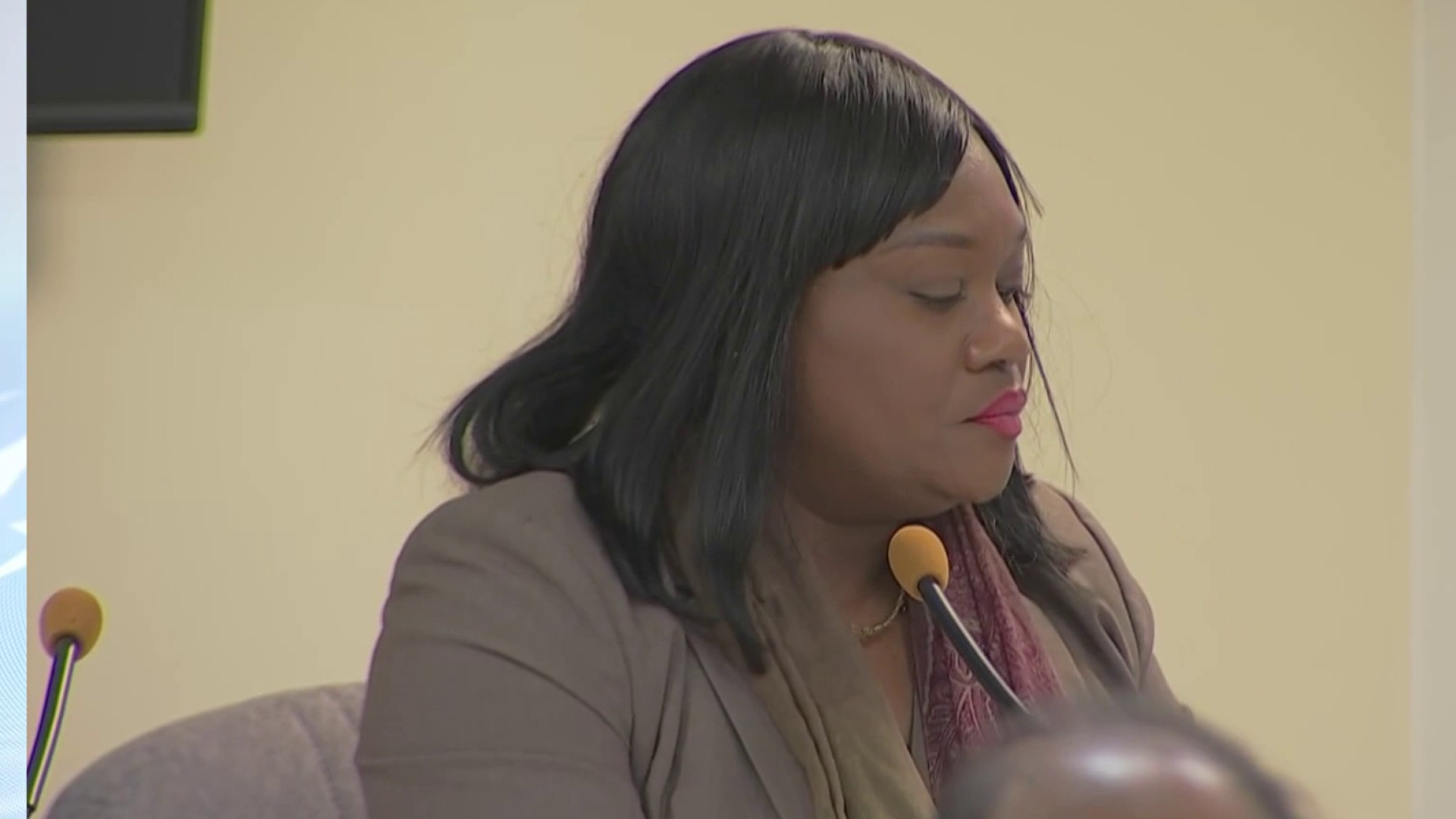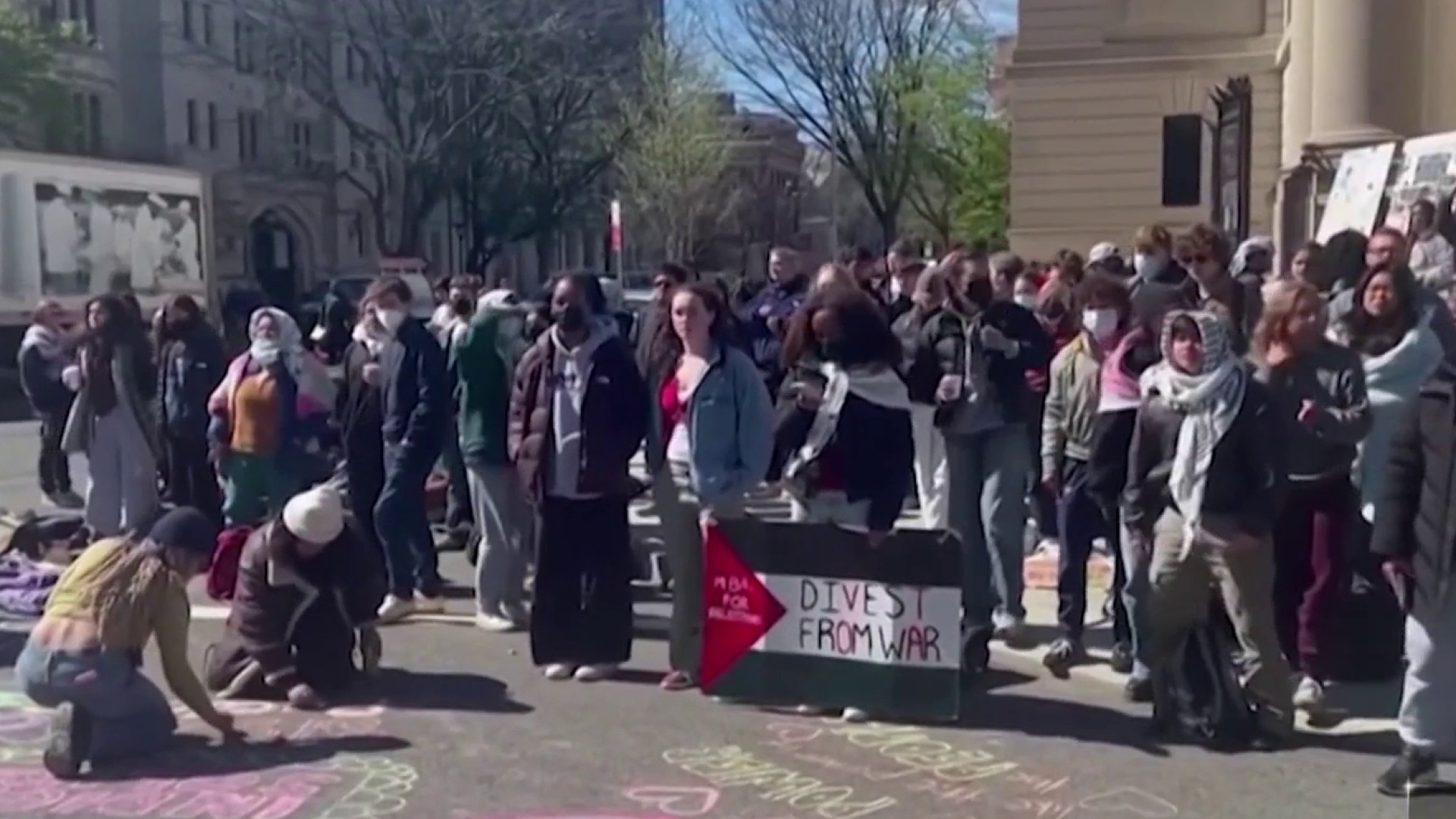Jim Kenney would be the next Democratic candidate for Mayor of Philadelphia if the primary were held today, an exclusive poll conducted for NBC10 and our newspaper partners found.
Kenney, the former at-large city councilman, holds a commanding 45 percent lead among 600 likely voters in Tuesday’s forthcoming primary, pollsters National Research, Inc. learned. The only independent poll of the primary cycle, the survey was commissioned by NBC10/Telemundo62, The Philadelphia Inquirer, Daily News and Philly.com.
Trailing behind and tied for second place — with 15 percent each — are state senator Anthony Hardy Williams and former District Attorney Lynne Abraham.
If the Democratic Primary for Mayor of Philadelphia were held today and you had to make a choice, for whom would you vote:
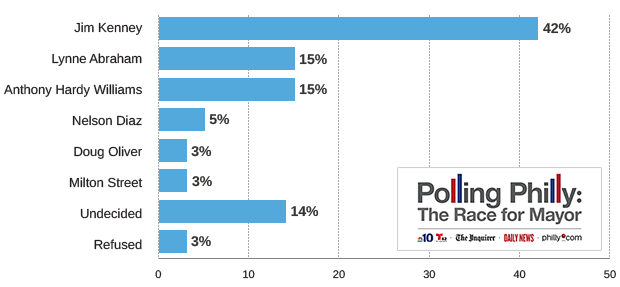
Conducted: May 9-11, 2015
Do you feel things in Philadelphia are heading in the right or wrong direction?
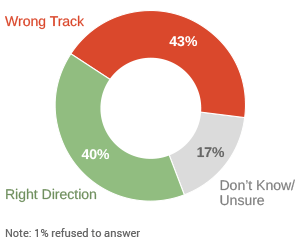
Conducted: May 9-11, 2015
The last poll was released in April by The American Federation of State, County and Municipal Employees (AFSCME) of which three of the local district councils have thrown their support behind Kenney. It showed a much tighter race with Kenney getting 26 percent of the vote, Williams at 25 percent and Abraham at 22 percent.
"This is really shocking,” said David Thornburgh, president and CEO of the government watchdog group Committee of 70. “I think that conventional wisdom is that everything was pretty neck-and-neck."
In the new poll, the remaining three candidates received single digit support: Nelson Diaz with 5 percent, Doug Oliver with 3 percent and the same for Milton Street.
Fourteen percent of those surveyed remained undecided, but the pollsters charged with carrying out the survey believe Kenney’s lead is so large that he will still win by double digits. (They admit, though, that Kenney’s lead is slightly overstated.)
Thornburgh agrees saying “there’s not a whole lot of time for a pretty significant shift to happen."
Local
Breaking news and the stories that matter to your neighborhood.
“He embodies a lot of things that Philadelphians love,” said Geoff Kees Thompson, chair of the political action committee 5th Square. He cites Kenney’s past support of progressive issues like decriminalizing marijuana and supporting minorities including the LGBT community.
"He’s been able to build a large coalition,” Thompson said. “I really see him as a candidate that people really understand that he may be white, but he’s been champion of minorities for some time."
Kenney has stronger support from both White and Black voters than Williams, the polling found. One in five Blacks remained undecided in this survey and pollsters say they could support Williams, but even if they all did, it would not be enough to unseat Kenney.
The “Who would you vote for” numbers echo the candidates favorability, which was also asked of the potential voters. Among the six candidates, Kenney had the highest favorability rating — 68 percent — and the lowest unfavorable numbers at 9 percent.
Do you have a favorable or unfavorable view of the following candidates and city leaders?
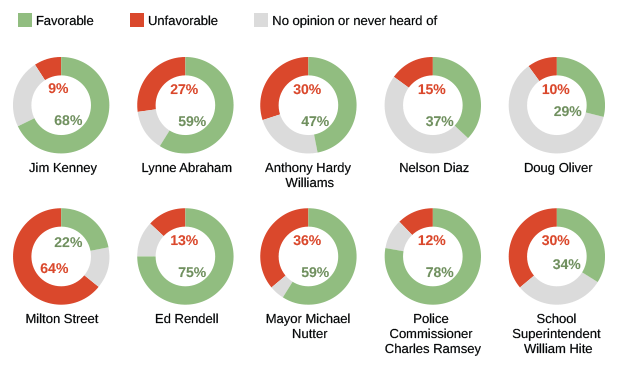
Conducted: May 9-11, 2015
“It’s hard to make somebody angry when you’re an at-large councilperson. You’re not blocking anyone’s development in their neighborhood. You’re a little above the fray,” said Richardson Dilworth, professor of political science, Director of Drexel University's Center for Public Policy and the grandson of the former mayor of the same name.
“He seems independent. It’s hard to stick him with the kind of Dougherty machine for some reason,” he added talking about electrician union boss John Dougherty’s backing.
Abraham comes behind Kenney with a 59 percent likability factor followed by Williams at 47 percent. The state senator had the second highest unfavorable percentage at 30 percent. Dilworth says the number suggests Williams support of charter schools, campaign finance violations and “blunders” during the campaign like his recent lack of support for Philadelphia Police Commissioner Charles Ramsey have hurt him.
The poll found Ramsey was the most liked local leader with a 78 percent favorability rating — ranking higher than former mayor and Governor Ed Rendell, Mayor Michael Nutter, schools Supt. Dr. William Hite and all six candidates.
While most of the candidates are well known, the youngest mayoral hopeful, Doug Oliver, has had trouble getting recognized. Thirty-three percent of respondents said they never heard of him and experts say it has to do with his in ability to raise cash.
Oliver put $32,691 into the bank for his campaign compared to the more than $1 million Williams and Kenney each raised.
“I think to cut through the noise you need a lot of money,” said Thompson.
The most important issue to voters surveyed is education. All three front-runner candidates — Kenney, Williams and Abraham — have focused on the issue, but a majority of voters don’t believe the latter two are able to solve the problem. Kenney also has the lead on the issues of jobs, crime and poverty, the poll found.
What single issue is most important to you that will determine your vote for mayor and city officials on election day?
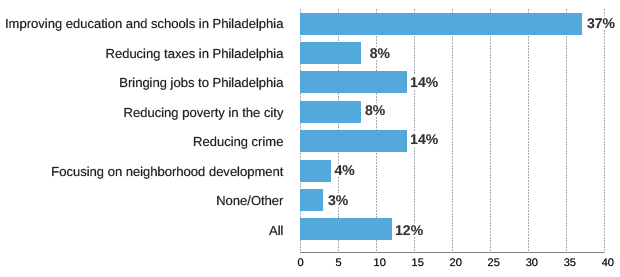
Conducted: May 9-11, 2015
As for whether Philadelphians are engaged with this year’s mayoral race, polling shows the majority are. More than half of those surveyed say they’ve paid a lot of attention to the candidates and the primary race. Another 42 percent said they’ve been partially paying attention to the race which has played host to dozens of debates and public forums.
“I was pleasantly surprised by how well, at least they said they were informed about the election,” Thornburgh with the Committee of 70 said. He and Dilworth both say that these results are most likely inflated, however, because people don’t want to seem out of touch.
On a scale of 1-10, how much attention have you been paying to the upcoming Democratic mayoral primary? One meaning no attention, five meaning some attention and 10 meaning a great deal.
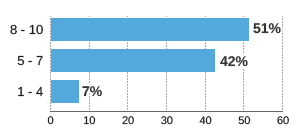
Conducted: May 9-11, 2015
With the release of these numbers and days to the primary, Thornburgh said be prepared to see candidates go negative to try and regain ground.
“The only way it could work to [Kenney’s] disadvantage is if the campaign sat back and did nothing, which I don’t think they will do,” the expert said. “I like to say the only poll that counts is on election day."

